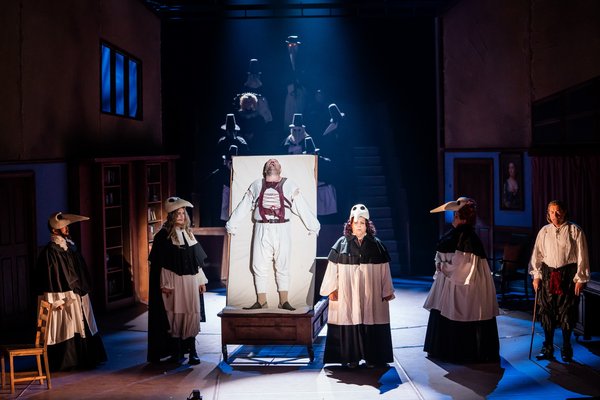Prelude
Molière, the comedy writer expresses his gratitude to King Louis XIV of France for accepting his troupe into his royal grace and watching their performance.
Act I
Argan, who imagines himself to be sick and who is portrayed by Molière himself, takes stock of the prices of the medicines he is required to take. Although he considers them too expensive, he devoutly believes in their efficacy. The servant Toinette appears on scene, who sees through Argan and tells him that she considers doctors to be nothing but frauds. Argan’s daughter Angélique tells Toinette that she is in love, even showing her the letter she received from young Cléante in which he proposed to her.
Argan tells Angélique that he wants to find her a suitor. The girl is happy until she finds out that they are not talking of the same young man: her father wants her to wed Théophile, the son of his doctor Purgot. Since his daughter resists the idea, Argan collapses, unconscious.
Argan’s wife Béline arrives. Her husband complains about Toinette, saying she refuses to believe his sicknesses, but the servant girl lies to Béline, saying she had just recommended that Argan send their daughter to a convent, which is in truth Béline’s desire. This immediately wins Béline over, who continues to protect Argan and care for him. And it has its results: the man intends to leave his entire fortune to his wife.
The young Cléante enters, saying that he is here to substitute Angélique’s singing teacher, who has become ill. Argan calls his daughter to the teacher, when Doctor Purgot and his son Théophile suddenly show up. Théophile, a feeble-minded medical student, turns to Argan, repeating a greeting he learned, and then faces Angélique to ask for her hand in marriage. But the girl incites a small rebellion, which is soon quelled by Argan. He asks the doctor to treat him. The doctor proposes that his son should examine Argan, whose diagnosis is the same as the one made by his father. Let the singing class start! Cléante and Angélique improvise a duet about two youngsters who cannot belong to each other because of a cold-hearted father. Argan doesn’t enjoy it, and he sends Cléante away.
This is followed by another storm brewed by the entry of Béline: Angélique resists the forced marriage, in response to which her mother would send her away to be a nun. Purgot is outraged, Théophile fails to comprehend the situation, and Toinette attempts to save what she can.
Interlude
Louis XIV issues a veiled threat to Molière for his Tartuffe, which puts the Church in a bad light. But he allows the writer to premiere his newest piece at the Palais Royal.
Act II
Toinette decides to save Angélique because the girl’s happiness is important to her. Argan arrives, feeling as if death is upon him now that even his beloved child has turned against him. Toinette tries to dissuade him from executing his plan, but he remains steadfast, falls ill, calls for a doctor, and exits. The two Purgots arrive, and Toinette makes them believe that Argan has been cured. The doctors leave, outraged. When Argan returns, Toinette acts distressed about the fact that the doctors have left. But she then reports the arrival of another, “miraculous” doctor. Cléante enters dressed as a doctor: he examines Argan and meanwhile reveals his identity to Angélique. The boy comes up with a new diagnosis for everything that the Purgot pair said and recommends amputating one of Argan’s arms and poking out one of his eyes. He then leaves.
Argan sees through the ploy: Angélique is glad to see the new doctor because that means the young Purgot won’t come around anymore. At the earlier recommendation of his wife (and because he will allow only a doctor to marry into the family), Argan decides to send his daughter to a convent. So Toinette suggests that he should pretend to be dead so they can judge on the basis of Béline’s reaction how much she deserves to be fully trusted. When the wife arrives home, Toinette pretends to be in deep mourning, and tells her that Argan has passed away, to which the evil woman expresses her relief. When she wants to quickly collect her money, Argan suddenly “comes to life.” Béline is surprised, tells him everything, and storms off. The miserable, disappointed Argan feels that the end has come. Cléante, still dressed as a doctor, comes at the most opportune time possible: Argan is so scared that he would rather be healed than be sick, and gives his daughter to the young man. According to Cléante, Argan would have done better to become a doctor himself.
Postlude
Molière falls out of favour with Louis XIV permanently because of his immorality. The writer and actor is broken and is barely able to start the finale to The Imaginary Invalid.
Finale
Molière, who is playing Argan, falls ill just before the doctoral title is conferred upon Argan. The play is interrupted.

